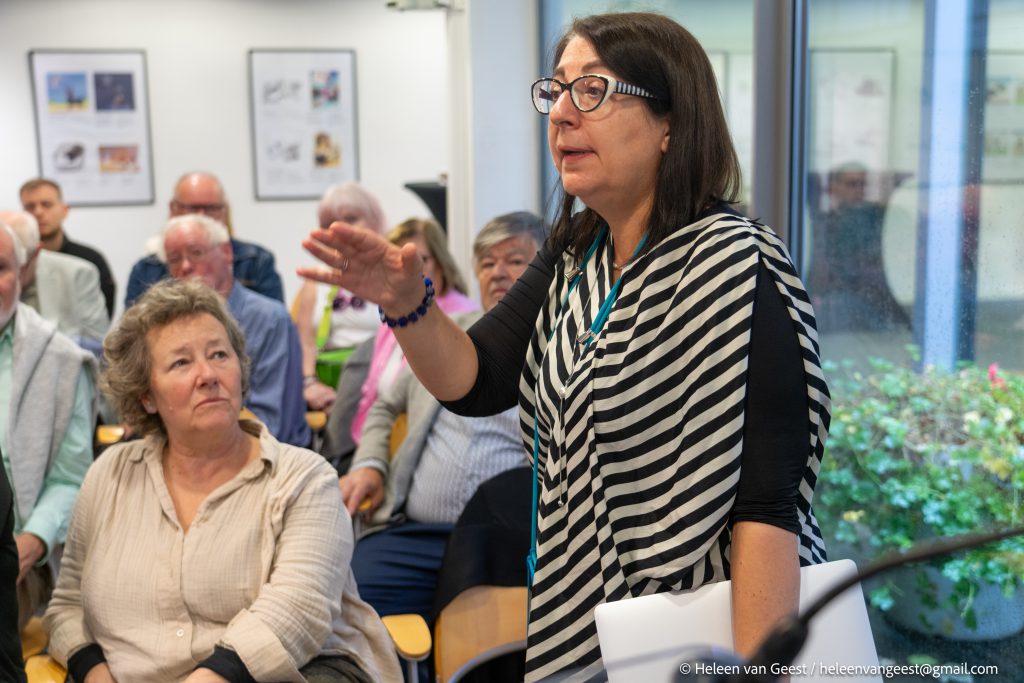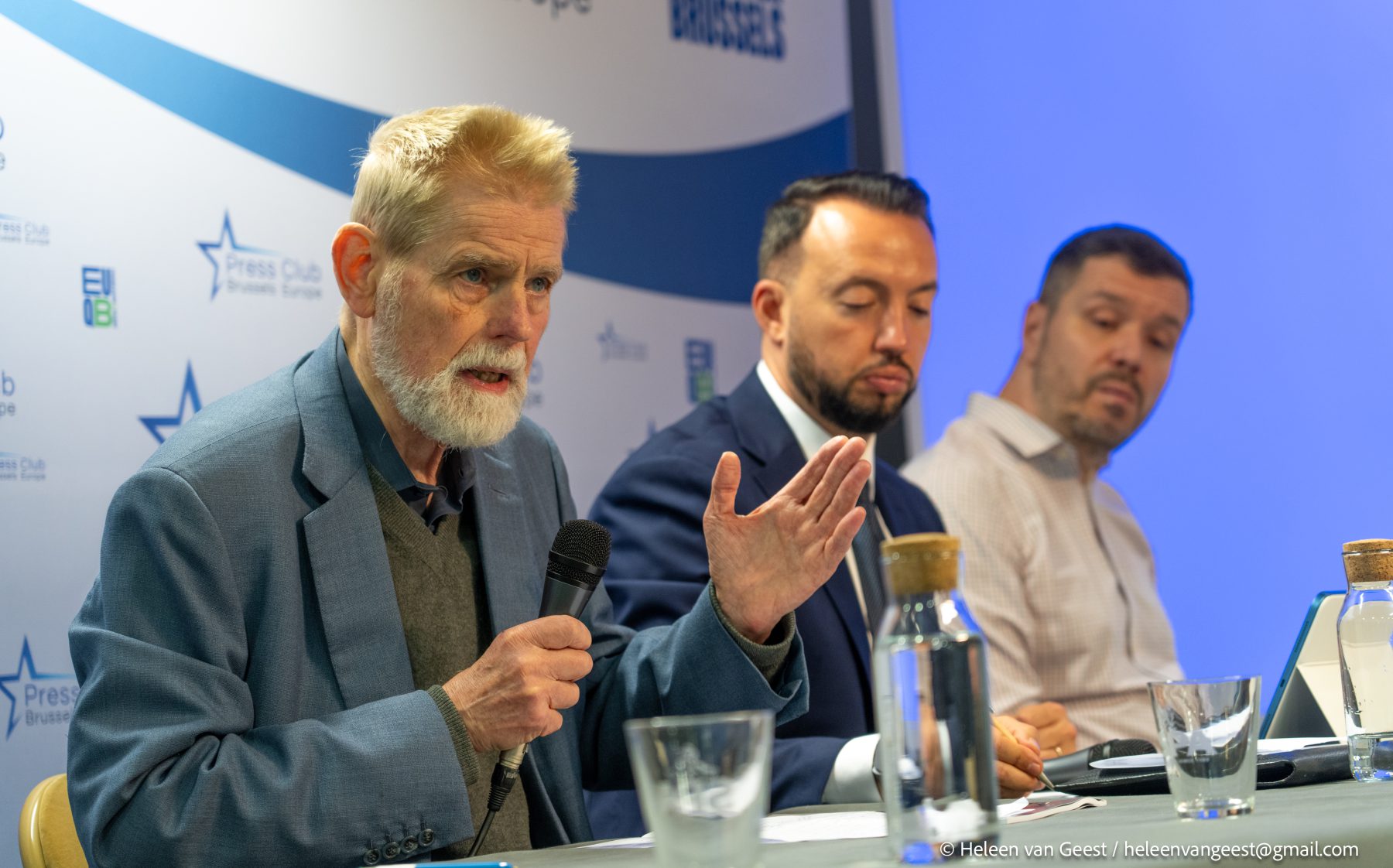From William Horsley, AEJ media freedom representative, with Irina Nedeva, AEJ Bulgaria
November 12, 2025
Major AEJ activities for press freedom
In 2025 the AEJ has continued to take active part in extraordinary cooperations with like-minded organisations to defend free and independent media and to push European governments to free jailed journalists, reform oppressive laws (such as SLAPPS) and enact mechanisms to deliver better protections for journalists’ lives and work. The AEJ’s efforts have contributed to raising press freedom and journalists’ safety issues as key pillars of European institutions including the Council of Europe and EU.
In March 2025 the 10th anniversary of the launch in 2015 of the Platform for the Safety of Journalists (which the AEJ co-founded) was marked by major public events in Brussels and London publicising the 2025 Annual Report of the 15 Platform partner organisations, who include the AEJ, EFJ, RSF and IPI. Both events were open to AEJ members and livestreamed. They featured frontline journalists testifying about the intimidation, surveillance and harassment they had suffered. The Annual Reports assess the almost 2000 press freedom verified alerts published by the AEJ and others during the past ten years – providing a massive database as a guide to important reforms to laws and practices. Each alert is sent to the government concerned asking it to take specific remedial action to stop attacks against media freedom – including violence, political intimidation, disinformation and attempts to capture the media.

In September 2025 AEJ Bulgaria colleagues Irina Nedeva and Maria Chereseva helped to organise a press freedom mission to Bulgaria by 8 Platform partners, resulting in a hard-hitting report Fragile Media Freedom Progress at Risk of Backsliding Without Urgent Reforms . Among the practical gains being sought are stronger legal protections for journalists against violent attacks, and safeguards against political interference in public service TV in Bulgaria.
Other recent press freedom missions by the press freedom partner groups have visited Hungary, Georgia and Ireland to apply pressure on governments to enact specific reforms so journalists can work without fear or outside interference -see details on the Platform website .
In July the Partner organisations wrote an Open Letter to the Prime Minister of Greece urging him and his government to take effective action to bring the killers of two unresolved murders of journalists to justice, end the threat of covert surveillance of media workers, and set up an effective National Action Plan to counter multiple other abuses against free media. The AEJ regularly speaks out, independently or with others groups, for persecuted media workers and demand justice for murdered journalists such as Daphne Caruana Galizia (Malta) and Jan Kuciak (Slovakia).
The AEJ regularly joins other influential press freedom groups in issuing other joint public statements in response to violent attacks and arbitrary arrests of journalists which are of concern to our members; and marking the anniversaries of assassinations such as that of Daphne Caruana Galizia in Malta. We are also members of CASE, the Coalition Against SLAPPs in Europe
Real impacts
Over the years these multiple initiatives and pressures have led the both EU and Council of Europe to prioritise support and protection for media freedom and journalists’ safety in new ways, including the European Media Freedom Act and anti-SLAPP Directive ,The European Commission uses the Platform partners’ reports as a major source of information in its annual Rule of Law reports, and promotes mechanisms to protect media freedom in the member states and beyond.
The Council of Europe’s 5-year Journalists Matter campaign which began in 2023, gives AEJ members and other journalists new opportunities to engage directly with national governments to raise complaints and strengthen protections. All 46 member states (except Turkey and a very few others) now participate in the ambitious campaign; its website lists the names of a designated “focal point” in each country who coordinates campaign activities there. The campaign has led to significant reforms giving journalists stronger protections against violence ; and judicial reforms to improve the record of European states in investigating and prosecuting cases when journalists are killed .
Since 2015 I have been able on behalf of the AEJ to contribute directly to drafting the Council of Europe’s key standard-setting document setting out states’ legal obligations to protect journalists’ safety . Such “soft law” texts can have positive influence in judgments by the European Court of Human Rights in cases brought on behalf of persecuted journalists. In consultation with AEJ sections we have contributed to publishing urgent press freedom alerts on the Platform about hundreds of attacks and abuses – including those against journalists in Albania, Armenia, Austria, Belgium, Bosnia, Bulgaria, Cyprus, France (Charlie Hebdo killings), Greece, Hungary, Italy (criminal defamation), Poland (politicisation of PSB), Slovakia (PSB), Turkey & Northern Cyprus.
In response to structural flaws in states’ national laws and media regulatory frameworks that obstruct legitimate journalism, the Platform has published in-depth critical analyses in the form of ‘systemic alerts’ , These assess the relevant data to recommend remedial measures in 9 countries with regard to their defamation laws, and 6 countries with regard to systemic failures to safeguard the independence of public service media. The Platform site also monitors the most serious forms of repression of media freedom in Russia and Belarus which are not Council of Europe member states.
The Platform Partners can exert influence through dialogue with European governments via its well-established relationship with the Group of Friends [of media freedom] in Strasbourg, representing Austria, France, Greece, Latvia, Liechtenstein, Lithuania, Luxembourg, the Netherlands, Norway, Portugal, Sweden, Switzerland and the United Kingdom.
The AEJ is a long-standing member of the Council of Europe’s Conference of International NGOs (INGOs) , a statutory body and forum for debate on a wide range of issues related to civil and political rights. Its mandate is to strengthen the role of civil society in a pluralist democracy, in particular promoting public participation in decision making.
Appointment of my successor
In 2025, as AEJ Media Freedom Representative, I signed the Memorandum of Understanding with the Secretary-General of the Council of Europe which launched the Platform for the Safety of Journalists. The other founder members were EFJ, IFJ, Article 19 and Reporters Without Borders. Now the Platform has 15 partner organisations and has an influential voice.
After many years as the AEJ’s Media Freedom Representative and the association’s regular contributor to the dynamic work of the Council of Europe Platform partners, I wish to step back from that frontline role, while remaining an active member of the association.
Happily, Irina Nedeva of AEJ Bulgaria, who has provided valuable support to this work during the past year, is very well qualified, and said she is willing to succeed me in that position.
I urge this General Assembly to appoint Irina as our association’s new Media Freedom Special Representative.
Thanks for your support down the years.
William Horsley








